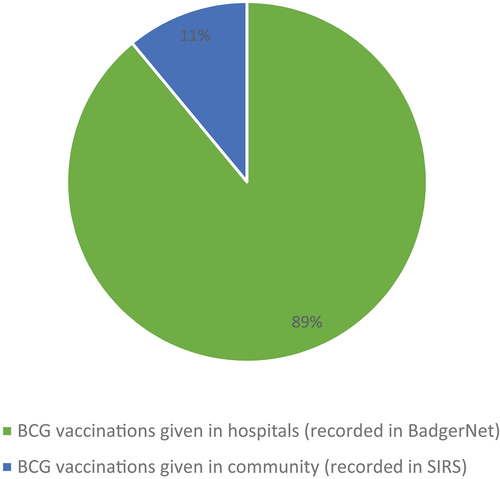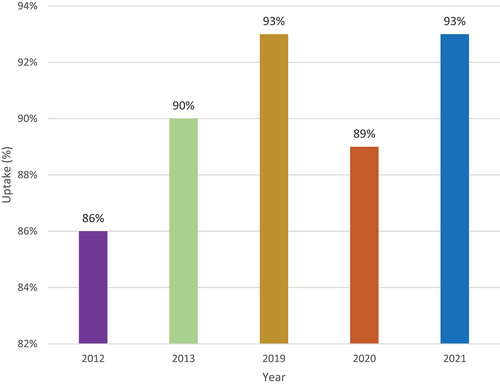ABSTRACT
Bacillus Calmette–Guerin (BCG) vaccine confers protection against tuberculosis (TB) and works most effectively when given to infants. Scotland runs a risk-based program in which BCG vaccine is offered to infants whose parent or grandparent was born in a high incidence country for TB. BCG vaccination records for all infants born in Grampian from 1st January 2019 to 31st December 2021 were reviewed from Nov 2022 to Feb 2023. Three electronic databases were examined, i.e. BadgerNet, Scottish Immunisation Recall System and TrakCare. Data were analyzed using Microsoft Excel 2013. Out of a total of 16,078 live births in the 3-year study period, 2060 met the criteria for offering BCG vaccination. The uptake level was 93% in 2019, 89% in 2020 (in the midst of the COVID-19 pandemic) and 93% in 2021. Audit results demonstrated higher uptake than the 85% key performance indicator target within the 2018 Scottish TB Framework and improvement in vaccination rates as compared to earlier rates of 86% in 2012 and 90% in 2013 in Grampian. Strengthening electronic systems and enhancing awareness regarding TB and the BCG vaccine can further progress BCG vaccination uptake.
Introduction
Tuberculosis (TB) is a preventable bacterial infection which leads to approximately 1.5 million deaths annually worldwide with 11% of these deaths occurring in infants, children and young people.Citation1 The annual incidence of TB in Scotland is 4.4 cases per 100,000 population and is significantly higher in individuals born outside the UK as compared to individuals born in the UK.Citation2 According to 2021 statistics, individuals born outside of the UK account for 72% of all TB cases in Scotland.Citation2
The bacillus Calmette–Guérin (BCG) vaccine is a live attenuated vaccine that confers protection against TB infection and is 70%–80% effective against the most severe forms of the disease, such as TB meningitis.Citation3 Since 2005, Scotland operates a targeted neonatal vaccination program replacing the former universal BCG vaccination program of school-age children.Citation4 Evidence alludes that this strategy is associated with reduced incidence of TB.Citation4 The primary indication for administration of neonatal BCG vaccine in Scotland is infants (aged 0–12 months) with a parent or grandparent born in a country where the annual incidence of TB is ≥40/100,000.Citation5
NHS Grampian is one of the fourteen regional health boards in Scotland which provides healthcare services for half a million people in Grampian area, i.e. Aberdeen, Aberdeenshire and Moray. A previous audit found that the uptake of BCG vaccine in at-risk infants in Grampian was 86% in 2012 and 90% in 2013.Citation6 The objectives of the current audit were as follows:
To review uptake rates for BCG vaccination over a 3-year period (2019–2021) in Grampian
To compare the outcome to the earlier audit as well as national uptake guidelines to propose evidence-based recommendations for service improvement.
Methods
BCG vaccination records for all infants born in Grampian from 1st January 2019 to 31st December 2021 were reviewed from Nov 2022 to Feb 2023. Three electronic databases were scrutinized for this audit, i.e. BadgerNet, Scottish Immunisation Recall System (SIRS) and TrakCare. BadgerNet is a comprehensive electronic perinatal care platform which encompasses data generated in real-time regarding risk factors for TB and BCG vaccination entered by midwives and other health professionals involved in maternity care in hospitals. SIRS captures information on all childhood immunizations in Scotland including BCG vaccination given in the community (after discharge from hospital) by primary care health visitor (HV) teams. TrakCare is an electronic patient record system connecting primary, community and hospital care services to ensure continuity of care.
For the purpose of this audit, firstly BCG vaccination data for the 3-year study period were extracted from BadgerNet. Following that, information regarding BCG vaccination given in the community was obtained from SIRS. TrakCare was continuously consulted to obtain relevant demographic information and bridge gaps in data. In case of incomplete, missing or ambiguous information parents and/or HVs were contacted via telephone to obtain further information and necessary clarifications to ensure final data accuracy. After subjecting data to cleansing, it was analyzed using Microsoft Excel 2013.
Results
A total of 16,078 live births in Grampian from 2019 to 2021 were identified, and 2060 (12.8%) neonates met the criteria for offering BCG vaccination, i.e. parent or grandparent born in high incidence area for TB. A total of 266 data entry errors including typos, repetition and deletion mistakes made while inputting data into system by healthcare staff were identified. For 66 infants, the key TB risk factor for offering BCG vaccination (parent or grandparent born in high incidence country for TB) was recorded as “yes”, but there was incomplete information regarding BCG vaccination. For another 260 infants, the key TB risk factor for offering BCG vaccination was listed as either unknown or unrecorded (instead of “no”). The total uptake of BCG vaccination in eligible babies over the 3-year period was 92% (). Similar rates were found for infants born in 2019 and 2021, while the uptake rate for 2020 births was lower. A total of 173 (8%) eligible infants born in the 3-year period were not given BCG vaccine.
Table 1. BCG vaccination in Grampian.
illustrates the recording of BCG vaccination given post-birth at maternity hospitals and documented in BadgerNet and those given in the community and recorded in SIRS only.
illustrates the vaccination trends in Grampian over time.
Discussion
The audit results demonstrate higher uptake than the 85% key performance indicator target within the 2018 Scottish TB FrameworkCitation7 and improvement in vaccination rates in Grampian as compared to earlier rates in 2012 and 2013.Citation6 The BCG uptake level (92%) in at-risk infants in Grampian is in contrast to studies conducted in EnglandCitation8 and Wales,Citation9 where the average uptake was 68% and 76%, respectively. The uptake rate is lower in 2020 as compared to 2019 and 2021, which is likely due to the advent of unprecedented COVID-19 pandemic and its detrimental impact on healthcare systems. The disruptive effect of COVID-19 on BCG vaccination rates is corroborated by a nationwide survey conducted in Greece.Citation10
The majority of BCG vaccination was given post-birth at maternity hospitals, which is in line with National Institute for Health and Care Excellence (NICE) recommendations.Citation11 Evidence suggests that uptake of BCG vaccine is higher in postnatal wards as compared with community settings.Citation8
There were several data entry errors and incomplete data recorded in electronic databases particularly BadgerNet. It is important that staff who are entering information in the databases are properly trained to minimize data errors.
There were some at-risk infants for TB who had not been given BCG vaccine. This could be due to various reasons including refusal of vaccine by parent/guardian, ineligibility for BCG vaccine at birth due to medical reasons and awaiting appointment in the community. Since the reason for non-administration of BCG vaccine is not a mandatory field for completion on BadgerNet or SIRS, definitive conclusions cannot be made. Evidence reveals that doubts regarding vaccine safety and effectiveness are important factors in refusing vaccination.Citation12 NICE guidelines recommend that all eligible neonates for BCG vaccination should be identified before birth and vaccination should be discussed with parents/legal guardians.Citation11 It is important that healthcare providers provide all necessary information to families and discuss their concerns to enable them to make best-informed decisions for the health of their children.Citation13 It is also essential that postnatal ward staff, midwives, HVs and other clinicians are educated regarding identification of eligible babies, local service information and administration of BCG vaccine and contraindications.Citation11
Conclusion and recommendations
Neonatal BCG vaccination coverage in Grampian is good and is improving over time. However, sustained efforts need to be undertaken to progress the uptake of BCG vaccination. Strengthening electronic systems for data recording and increasing awareness can further progress BCG vaccination uptake which constitutes an important step for Scotland to realize World Health Organization’s ‘End TB Strategy’ and achieve 90% reduction in TB incidence by 2035.Citation2
It is recommended to work with the BadgerNet system developers (Clevermed) to improve recording of information and management of data. It is also recommended to undertake periodic data reviews with proposition that the next BCG vaccine audit is carried out in 2025 taking into account the changes being made to BCG vaccination program in the UK including introduction of severe combined immunodeficiency evaluation at birth and administration of BCG immunization for eligible neonates at 28 days.Citation14
Disclosure statement
No potential conflict of interest was reported by the author(s).
Data availability statement
The data underlying the study are not publicly available due to privacy restrictions.
Additional information
Funding
References
- World Health Organization. Tuberculosis. 2022 [accessed 2023 Mar 22]. https://www.who.int/health-topics/tuberculosis#tab=tab_1.
- Public Health Scotland. Tuberculosis annual report for Scotland 2021. [accessed 2023 Jun 2]. https://www.publichealthscotland.scot/publications/tuberculosis-annual-report-for-scotland/2021-tuberculosis-annual-report-for-scotland/.
- Rodrigues LC, Diwan VK, Wheeler JG. Protective effect of BCG against tuberculous meningitis and military tuberculosis: a meta-analysis. Int J Epidemiol. 1993;22(6):1154–3. doi:10.1093/ije/22.6.1154.
- Abbott S, Christensen H, Welton NJ, Brooks-Pollock E. Estimating the effect of the 2005 change in BCG policy in England: a retrospective cohort study, 2000 to 2015. Euro Surveill. 2019 Dec;24(49):1900220. doi:10.2807/1560-7917.ES.2019.24.49.1900220.
- UK Health Security Agency. Tuberculosis: the green book, chapter 32. 2018 [accessed 2023 Jun 3]. https://www.gov.uk/government/publications/tuberculosis-the-green-book-chapter-32.
- Shanks S, Duthie S. How good is our neonatal BCG uptake? A snapshot in Grampian. J Public Health (Oxf). 2016;38(2):e122–4. doi:10.1093/pubmed/fdv091.
- Scottish Health Protection Network. TB framework for Scotland. 2018 [accessed 2023 Jun 15]. https://hps.scot.nhs.uk/web-resources-container/tb-framework-for-scotland/.
- Nguipdop-Djomo P, Mangtani P, Pedrazzoli D, Rodrigues LC, Abubakar I. Uptake of neonatal BCG vaccination in England: performance of the current policy recommendations. Thorax. 2014;69(1):87–9. doi:10.1136/thoraxjnl-2013-203931.
- Srinivasan R, Menon L, Stevens P, Campbell I, Alfaham M. Ethnic differences in selective neonatal BCG immunisation: white British children miss out. Thorax. 2006;61(3):247–9. doi:10.1136/thx.2004.036269.
- Maltezou HC, Magaziotou I, Tseroni M, Syrigonaki K, Syrogiannopoulos GA, Tsolia M, Roilides E, Theodoridou M, Georgakopoulou T. Adherence to recommendations for bacillus Calmette-Guérin vaccination of high-risk neonates in Greece. Pediatr Infect Dis J. 2022;41(10):857–9. doi:10.1097/INF.0000000000003623.
- National Institute for Health and Care Excellence (NICE). Tuberculosis: NICE Guideline [NG33]. 2019 [accessed 2023 Jun 23]. https://www.nice.org.uk/guidance/ng33.
- Smith PJ, Humiston SG, Marcuse EK, Zhao Z, Dorell CG, Howes C, Hibbs B. Parental delay or refusal of vaccine doses, childhood vaccination coverage at 24 months of age, and the health belief model. Public Health Rep. 2011;126(2_suppl):135–46. doi:10.1177/00333549111260S215.
- McKee C, Bohannon K. Exploring the reasons behind parental refusal of vaccines. J Pediatr Pharmacol Ther. 2016;21(2):104–9. doi:10.5863/1551-6776-21.2.104.
- UK Health Security Agency. SCID and TB. Vaccine update. 2022 [accessed 2023 Jul 2]. https://assets.publishing.service.gov.uk/government/uploads/system/uploads/attachment_data/file/1073575/UKHSA-12375-VU-327-May22_SCID-TB-BCG.pdf.


